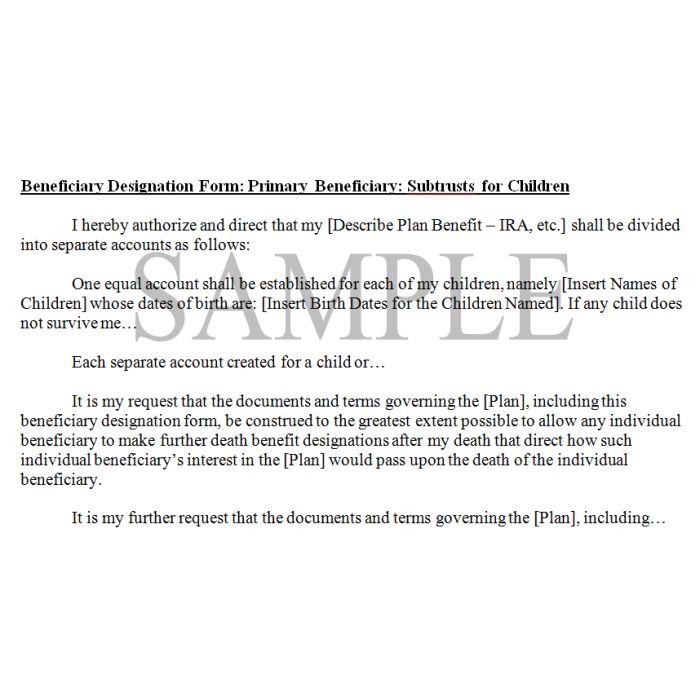Beneficiary Designation Form: Primary Beneficiary: Subtrusts for Children (2 Pages)
This Form names subtrusts created for the participant’s children as the Plan beneficiaries. The IRS takes the position in its rulings that if plan benefits are paid to a “master trust” and then divided into subtrusts for each beneficiary, the age of the oldest beneficiary of the master trust governs all required minimum distributions, regardless of how long (if at all) the plan benefits were actually held in the master trust. Accordingly, to avoid having the age of the oldest beneficiary be the measure for required distributions, it is necessary (and approved by the IRS) to have the plan benefit paid to designated subtrusts. That will enable the age of each subtrust beneficiary to be the age used for required minimum distributions to the trust for that beneficiary.
This Form names subtrusts created for the participant’s children as the Plan beneficiaries. The IRS takes the position in its rulings that if plan benefits are paid to a “master trust” and then divided into subtrusts for each beneficiary, the age of the oldest beneficiary of the master trust governs all required minimum distributions, regardless of how long (if at all) the plan benefits were actually held in the master trust. Accordingly, to avoid having the age of the oldest beneficiary be the measure for required distributions, it is necessary (and approved by the IRS) to have the plan benefit paid to designated subtrusts. That will enable the age of each subtrust beneficiary to be the age used for required minimum distributions to the trust for that beneficiary.
Author:
Steven G. Siegel is president of The Siegel Group, a Morristown, New Jersey - based national consulting firm specializing in tax consulting, estate planning and advising family business owners and entrepreneurs. Mr. Siegel holds a BS from Georgetown University, a JD from Harvard Law School and an LLM in Taxation from New York University.
He is the author of several books, including: Planning for An Aging Population; Business Entities: Start to Finish; Taxation of Divorce and Separation; Income Taxation of Estates and Trusts, Preparing the Audit-Proof Federal Estate Tax Return, Putting It Together: Planning Estates for $5 million and Less, Family Business Succession Planning, Business Acquisitions: Representing Buyers and Sellers in the Sale of a Business; Dynasty Trusts; Planning with Intentionally-Defective Grantor Trusts; The Federal Gift Tax: A Comprehensive Analysis; Charitable Remainder Trusts, Grantor Trust Planning: QPRTs, GRATs and SCINs, The Estate Planning Course, The Retirement Planning Course, Retirement Distributions: Estate and Tax Planning Strategies; The Estate Administration Course, Tax Strategies for Closely-Held Businesses, and Tort Litigation Settlements: Tax and Financial Issues.
Mr. Siegel has lectured extensively throughout the United States on tax, business and estate planning topics on behalf of numerous organizations, including National Law Foundation, AICPA, CCH, National Tax Institute, National Society of Accountants, and many others. He has served as an adjunct professor of law at Seton Hall and Rutgers University law schools.
The Siegel Group provides consulting services to accountants, attorneys, financial planners and life insurance professionals to assist them with the tax, estate and business planning and compliance issues confronting their clients. Based in Morristown, New Jersey, the Group has provided services throughout the United States. The Siegel Group does not sell any products. It is an entirely fee-based organization.
Contact the Siegel Group through its president, Steven G. Siegel, e-mail: [email protected].
-
 Discretionary Accumulation Trust (14 Pages)Special Price $85.00 Regular Price $99.00
Discretionary Accumulation Trust (14 Pages)Special Price $85.00 Regular Price $99.00

